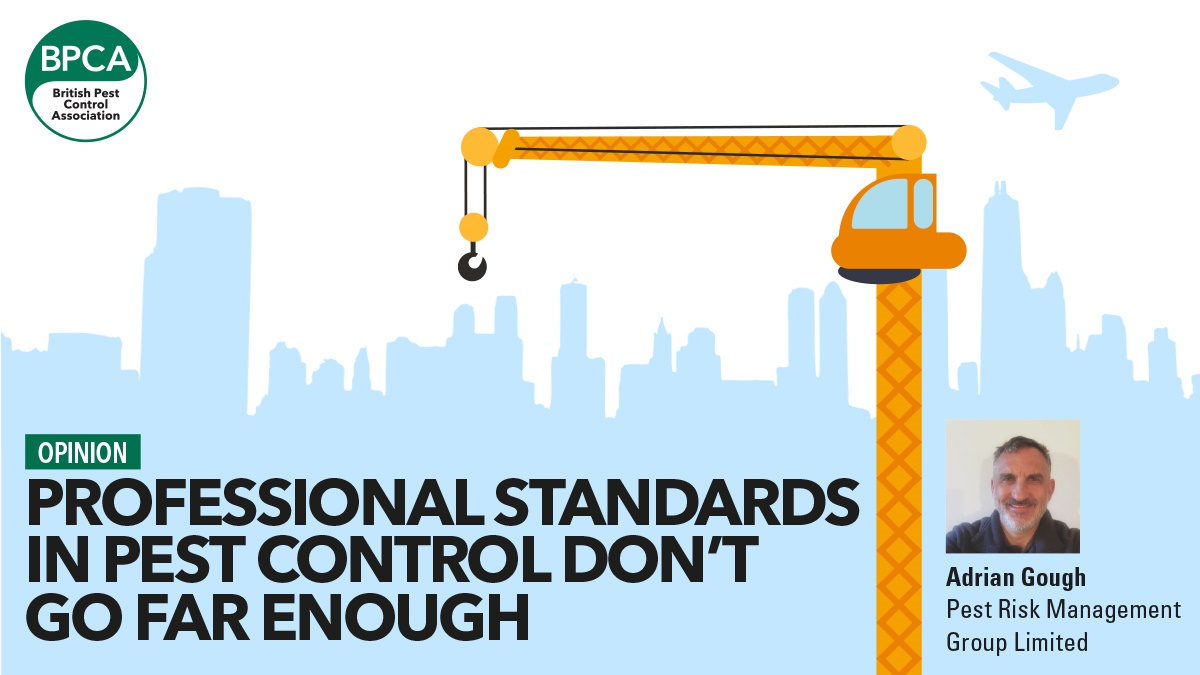PPC118 | OPINION
In this article, Adrian Gough of Pest Risk Management Group, talks about the upcoming CRRU proof of competence requirements.
Warning - This article will be like Marmite!

With the new rules being introduced for those wishing to purchase and employ professional-use rodenticides from 2026 onwards, it feels like a good time to talk about professional standards within pest control.
For those not in the know, in order to be able to purchase and use professional-use rodenticides from the beginning of 2026, you must have either:
- A CRRU-UK approved Level 2 certification issued within the last five years (from January 2026) OR
- A CRRU-UK approved certificate issued more than five years ago AND Proof of CRRU-UK approved CPD to the value of three points registered through a CRRU-UK approved CPD Scheme.
This has had those currently offering rodent control as part of their professional pest control services pulling in many different directions. In the one corner sits a group that thinks it an outrage.
“One licence too far!”
“More money for the suppliers!”
“Even more restrictions, yet the general public can buy what they want!”
There are those that sit in another corner, which includes myself, that think this goes nowhere near far enough. Before you spit your tea out, let me explain.
Firstly, let's look at the definition of the words “professional standards” in relation to a pest controller, not just providing rodent control but multifaceted services.
This refers to the established principles, behaviours, and practices that define the level of quality, competence, and ethical conduct expected in their trade.
Safety compliance
- Following safety guidelines for handling chemicals, tools and equipment
- Ensuring the safety of clients, pets, and the environment during pest control treatments
- Properly storing, using, and disposing of pesticides and other materials.
Commitment to best practice
- Staying up-to-date with advancements in pest control techniques, products and regulations
- Using environmentally friendly and humane methods wherever possible
- Conducting regular inspections to ensure thorough and effective service delivery.
Technical expertise
- Possessing the necessary knowledge of pest biology, behaviour, and infestation patterns
- Applying appropriate and effective pest control methods tailored to each situation
- Maintaining certifications and licensing as required by regulations.
Ethical practices
- Providing honest assessments and recommendations for pest management
- Avoiding unnecessary treatments or upselling unneeded services
- Respecting client property and privacy while performing services.
Communication and customer service
- Clearly explaining the treatment process, risks, and expected outcomes to clients
- Offering guidance on prevention and maintenance to minimise future infestations
- Responding promptly and professionally to customer inquiries or complaints.
The million-dollar question is: do either of these options we’re being asked to adhere to prove professional standards?
The simple answer is no!
In a world of social media where every second post is portraying poor practice, something is clearly wrong. Stopping sale of pest control products to the general public isn’t the answer.
They will always be available, as are plumbing products, building materials, electrical equipment, etc.
What we must do is bring in licensing for individuals. A licence that can be gained, but that can also be lost, if the underlying principles for achieving that licence are not followed.
This would provide proper credibility to an industry that currently doesn’t have a lot.
It creates a professional ethos amongst licensed individuals, It creates a clear distinction between amateur and professional.
For those who agree, there is a large but: to achieve it, we would have to rip up the current rule book. The role of our trade associations would probably change significantly. We would need a regulator, someone to implement, investigate, enforce.
The suppliers would need to embrace a potential reduction in the number of professionals, leading to a drop in revenue.
My last thought is - as an industry are we ready for it?
Adrian Gough
Pest Risk Management
Group Limited
Source: PPC118